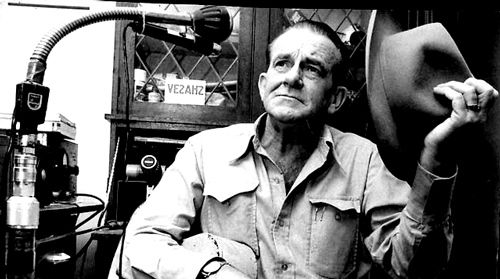
|
Tex Morton meets Banjo Paterson: Becomes a folk song collector
First time I met him was outside Randwick Racecourse, he was a great old sporting gentleman and I was street singing, singing to the crowds coming out and a couple of friends of mine, young chaps, were selling newspapers. One of them said, he said "I heard you talking about Banjo Paterson", he said "That's him over there buying a paper from my brother." And I said "Oh gee I'd like to meet him" and I was really impressed and very nervous, and he wanted to introduce me to him right there and then and I can remember backing out of it. I said "Oh no, you know, to me he was a great man, I was only a kid street singing. Not only that I had a bit of a complex because I'd been doing some early broadcasts on shows and I had recited without asking his permission, I had recited some of his poetry, and even put a couple of his tunes to music. I think I had the idea that he might appear at the studio, or round at my place, my boarding house and have a big policeman with him and a pair of handcuffs and a team of lawyers and throw me in gaol, heaven forbid, singing his, or reciting his poetry without permission. Anyhow, a couple of weeks later, without any further ado, one of these boys said "There's a young chap over here'd like to meet you" and from there our friendship grew and he was most helpful to me, he gave me a lot of encouragement, and I can always remember his cheery old smile and his handshake. When he realised I was trying to collect bush songs, and then he actually heard me appeal on the ABC, for fragments of half forgotten songs. I found that he and I got along fine, because he said "I agree what you said about these songs being preserved and handed down to future generations of young Australians". He said "I did it the hard way", and he said "I never was much of a singer." And he said "You go ahead and if you want to put some of my little jingles to music you go ahead, it's quite alright." So we had many discussions about folk music, Australian songs and derivations, where they came from, who wrote them. Mr. Paterson told me, he said "In my day I did it by horse and trap and by train and as much as I could he said "I like to think, it's nice to think that a young fellow like yourself who's going to pick up where I left off." And gosh, I was a proud kid, I stuck my chest out to have the great Banjo Paterson speak to me like that. And from there on I did, I appealed to my listeners on all my early programs, and I used to receive fragments of songs and poems sent in by the thousand. Written on scraps of paper, torn from schoolbooks and exercise books, and it was in that fashion that I began to collect many of the early Australian songs that I sang. Notes Many thanks to folklorist and collector Rob Willis who alerted me to this important recorded interview of Tex Morton. The Australian Dictionary of Biography entry on Morton reveals:
Between 1936 and 1943 (when he broke with Columbia) he recorded dozens of songs, many of which outsold in Australia and New Zealand those of established American mainstream popular singers. He successfully toured (1937-41) Australia with a large combined circus, rodeo and singing show. Later in World War II he entertained troops. He also performed with Jim Davidson's Australian Broadcasting Commission Dance Band and featured in 'Out of the Bag!' and 'Tex Morton's After-dinner Show' on ABC radio. While songs with American contexts and themes were still in Morton's repertoire, beginning with 'Wrap Me Up with My Stockwhip and Blanket', he began to apply the country-and-western style to local stories. He also abandoned his nasal singing in favour of a more melodic and mellow sound. Initially the themes in such songs as 'Black Sheep' and 'Rover No More' centred on bush life but later he also eulogised national heroes such as Ned Kelly and the racehorse Gunsynd ('The Goondiwindi Grey'). In 'Sergeant Small' (1938), a song that was banned for many years because the police officer, who was its subject, objected to this portrayal of him, Morton valourised itinerant workers and mocked figures of authority, locating himself within the nationalist bush legend tradition. The recording transcribed above is held and conserved at the National Film and Sound Archives Title No: 676697 |